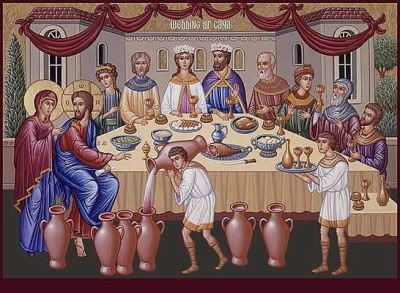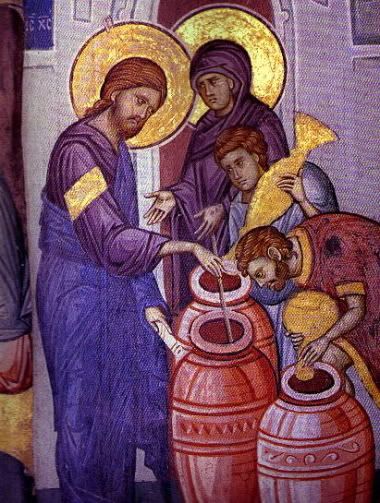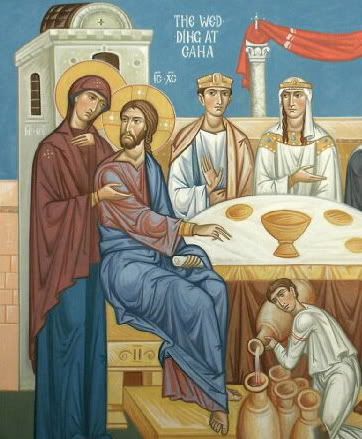
Once there was a bride who was very nervous about her wedding. She was not used to being in front of a crowd of people. She wasn’t sure she could even muster up the courage to walk down the aisle. As she was getting ready for the service, her mother gave her some words of calming wisdom.
She said to her, “Honey, there’s only three things you need to think about today. Just focus on these three things, and you’ll be fine. The first is walking down the aisle. Focus on walking down the aisle of that church. Don’t get caught up with anything or anyone on either side. Just visualize getting down that aisle.
"Next, focus on the altar. It is your destination today. Make your way to the altar to meet God. There you will stand with the man you love take vows together. Remember the altar that represents the love God has for both of you.
"Last, focus on the hymn that the soloist will sing. In poetry and song, the hymn embodies God’s love for you in Christ, your love for your husband and his love for you. Listening to that hymn will give you calm and comfort.
"So, to help you not be so nervous, focus on those three things: walking down the aisle, standing before the altar, and listening to the hymn." The bride was very thankful to her mom for her words of advice. She felt better now, and much more confident.
At the wedding, family and friends watched as she walked down the aisle and noticed a look of calm determination on her face. But as she passed them, they began to chuckle softly, for as she passed, they could hear her mumbling three words over and over again, “Aisle, Altar, Hymn… Aisle, Altar, Hymn…”

In today’s gospel (John 2:1-11), we find a message of transforming grace in the epiphany that came through the slight alteration of water into wine. St John tells us this was the first of his “signs”—those selected miracles which manifested Jesus’ divine nature—and it happened at a wedding in Cana of Galilee. I’m inclined to believe it happened the way it did for a reason. The question is, Why? At first, it didn’t look like it was going to work out that way.
Jesus and his disciples were invited to a wedding feast. (Despite what you may have heard, Jesus was not the one getting married.) It seems like it might have been a neighbor or family friend. It was perhaps someone Jesus’ mother knew well, for the servants seem to know her. It is also worth mentioning that out of a deep respect for her, St John never refers to the blessed Virgin by name in his gospel. She is always “woman” or “mother.”
Jewish weddings were an extravagant affair—a joyous celebration for seven days. It was expected that guests would arrive day by day throughout the week. An unexpectedly large turnout may be behind the reason for the crisis. “Wine makes the heart glad,” the Psalmist wrote, and it flowed freely at these festivities.
Jesus’ mother may be involved with the wedding celebration, because when the wine runs out, she notices there’s a problem right away. We can also see that the blessed Mother knows her Son very well. She knows that he is capable of working miracles. And she is willing to intercede with her Son on behalf of this young couple who don’t even yet know that there’s a problem with their marriage feast. “They have no wine,” she said softly, leaning toward Jesus’ ear.
She is already assuming the role of the Queen Mother in the Kingdom of God. The Queen Mother in ancient Israel had a unique ministry. She was to bring the needs of the people to the attention of her son the king, and to call the people to obedience and loyalty to the king. Mary does the same. . . “They have no wine.”
At first, Jesus seems almost annoyed. “Maaaaa!” Perhaps this is something they had argued about before. Is Jesus referring back to some previous discussion when he replies, “Now, what concern is that to you and me? My hour is not yet come”? In John’s gospel, Jesus’ “hour” is the manifestation of his glory through the cross. The signs or miracles that Jesus does leading up to that moment give a hint or glimpse of the ultimate glory that comes through his obedience at the cross. Jesus inquires, Why are you asking me for a miracle now? Surely it is not yet the right time.
Mary has made her case, ever so discreetly. She leaves the matter to his authority and judgment. As a good Queen Mother, she tells the King’s subjects. “Just do whatever he tells you,” she told the servants. It is a lesson she herself had come to know years before when visited by an angel.
I wonder how long Jesus thought about the matter. Is it time for a miracle? Is this the right moment? Is this the right context? However long the question was considered, it is certain that his reluctance faded and his resolve became clear: a wedding is the perfect occasion for the first miracle revealing the glory of the only Son of God. There is no hesitation in his voice when he tells the servants to fill the jars with water.

It would be customary to have plenty of water on hand for a Jewish festival as their traditions proscribed ritual washings with meals. The miracle is performed entirely behind the scenes. Its purpose is to strengthen the faith of the disciples and servants. The working of his first sign has always been considered a special endorsement of the dignity of marriage in the Christian tradition, showing the sacramental character of marriage by utilizing the creative and transforming power of God at that moment.
When the steward of the feast tasted the water which had become wine (the "drink of gladness") he marveled at how wonderfully it tasted. It was a reminder that God doesn’t just miraculously make wine, he makes good wine—the best wine ever tasted. He makes the supreme vintage, the cup of angels.
What was it ultimately that led Jesus to change his mind, to decide that a wedding is the perfect occasion to reveal his glory? I have wondered that. And then it dawned on me. We are told that the bond and covenant of marriage was established by God in creation (that's how the wedding liturgy expresses it), but God didn’t just invent marriage, God is married.
Throughout the Old and New Testaments, God is betrothed to his people. In our reading from Isaiah today (Is 62:1-5), God tells the people of Jerusalem, “As a young man marries a young woman, so shall your builder marry you, and as the bridegroom rejoices over the bride, so shall your God marry you.”
That’s why the Old Testament prophets call idolaters "adulterers." That’s why God is so jealous of the relationship he has with his people. That’s why the Song of Songs overflows with vivid erotic poetry (don’t tell the kids). That’s why God cares about chastity. That’s why the epistle to the Hebrews (13:4) says, “Marriage should be honored by all, and the marriage bed kept undefiled, for God will judge the fornicator and adulterer.”
That’s why Jesus tells us in the New Testament that divorce is not an option. That’s why St Paul describes Jesus as our bridegroom and his Church as his bride, and tells us that marriage is a great sacrament--the mystery that unfolds the meaning of the union between Christ and his Church. That’s why in the book of Revelation, the joy of heaven is compared with the joy of a great wedding banquet.
That’s why the intimacy of marriage is the best comparison we have to intimacy with God. That’s why we cannot reinvent or redefine marriage. That is a message many may not want to hear today, but it is what we all need to hear. Marriage belongs to God; it is not ours to recreate.
The truth is that man and woman were made for each other in creation. In Genesis we read that “the two shall become one flesh.” That’s why Jesus gives us his flesh to eat and blood to drink at this altar. Genesis explains, “That is why a man leaves his father and mother and is joined to his wife and the two shall become one flesh.” How do we know Adam and Eve were married? Very simply, they had children.
Most people are confused about marriage. They stumble over the simple truth that God reveals to us through the Scriptures. The truth is that marriage is not created by vows or promises or covenants or rings or even love. Marriage is created by the union of the body. “The two shall become one flesh.” To be our husband, to make us his bride, Jesus gave us his body.
Jesus loves us with the love of a husband. Why did he consider the cross to be a noble sacrifice? Why does God care so much about human marriage? It is because he is entirely, deliberately, eternally, passionately, and hopelessly in love with you. His is a love that overcomes fear, a love that embraces the good of another, a love that involves suffering, a love that doesn’t count the cost, a love totally naked before another, a love that is the total gift of self. “God so loved the world that he gave his only begotten Son” (Jn 3:16).
All of baptized believers are married to Christ. Some of you are married to one another. Did you know that Christ was at your wedding party? Whether you caught a glimpse of it or whether it was entirely behind the scenes, there was an epiphany and will be again.
Some of you know the power and love of God in your own marriage. Some of you know that power in your marriage to Christ. Some of you may not have realized that experience that yet. The young couple getting married in today’s gospel had no idea what wonders were going on behind the scenes just to bring them a few more moments of joy.
For some of you, a crisis has arisen as it had for them, but you have not yet become aware of it. The wine has not yet run dry in your marriage. For some of you, it may have been a long time since you tasted that wine--good wine. The glory of the Son manifested on that day may be a distant memory for your marriage. It may be a distant memory in your marriage to Christ.

In each case, the Queen Mother has taken notice. She has gently whispered in the ear of her Son, “They have no wine.” She is aware that it may take a miracle to keep the party going, and Jesus may decide that it is just about time that we had one. Don’t be afraid to ask him for one.


No comments:
Post a Comment